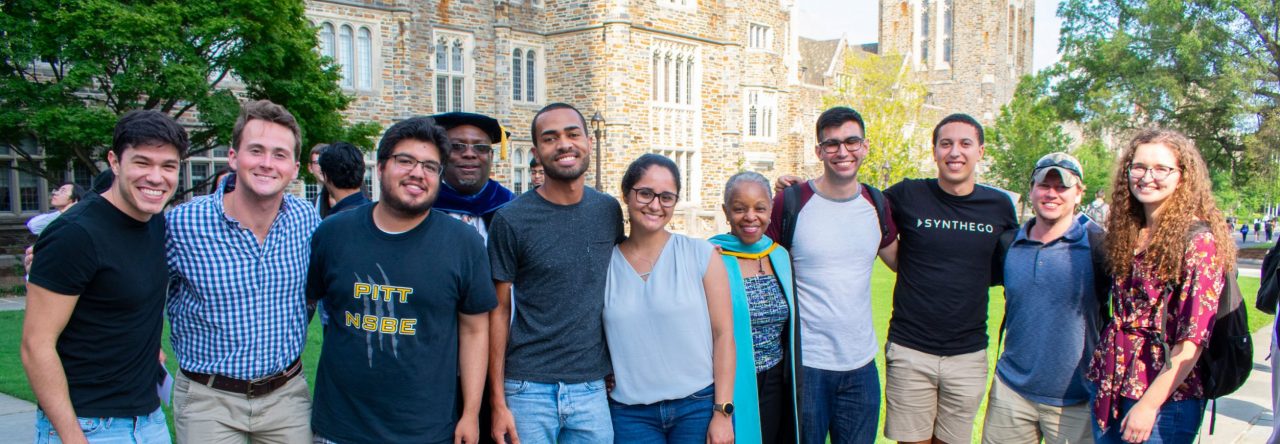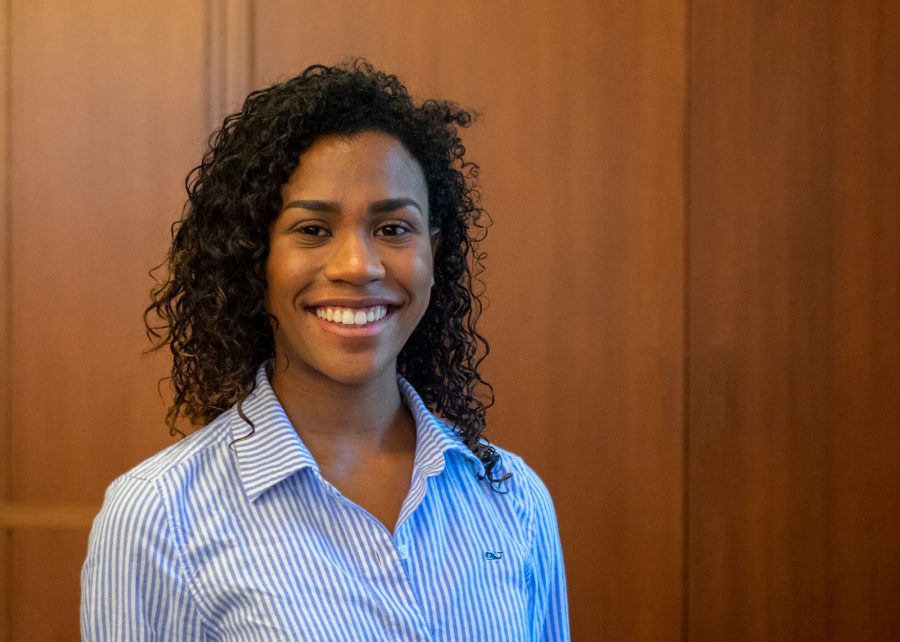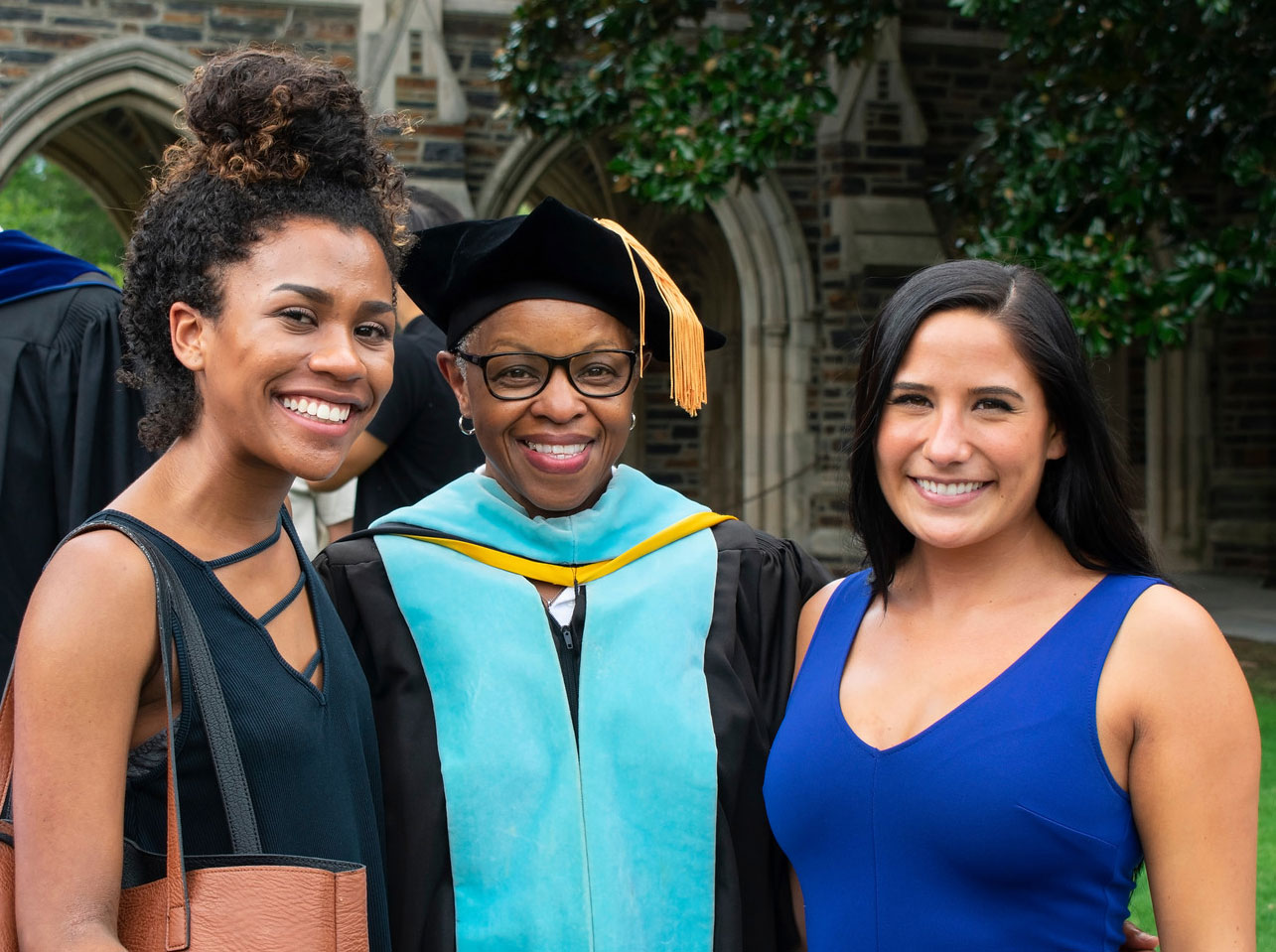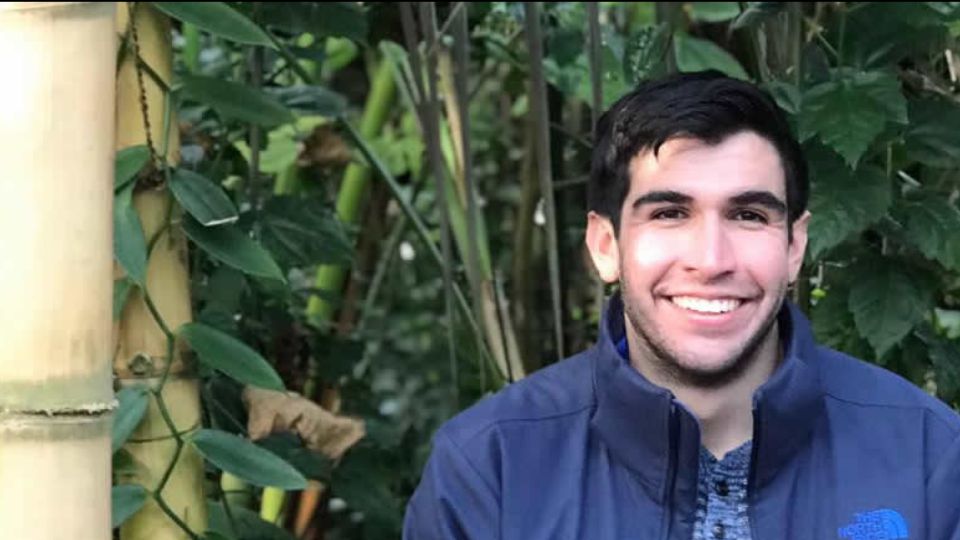Sloan Scholar Celine Robinson, a Ph.D. candidate in civil and environmental engineering, enriched her dissertation and mentored undergraduates through Duke’s Code+ summer program. Learn more about her experience in the story by Duke’s Office of Interdisciplinary Studies.
Category: Profiles

The Graduate School recently profiled siblings and Sloan Scholars Tyler and Alexis Johnson. Tyler is a fifth-year Ph.D. student in physics, while Alexis is in her second year in chemistry.
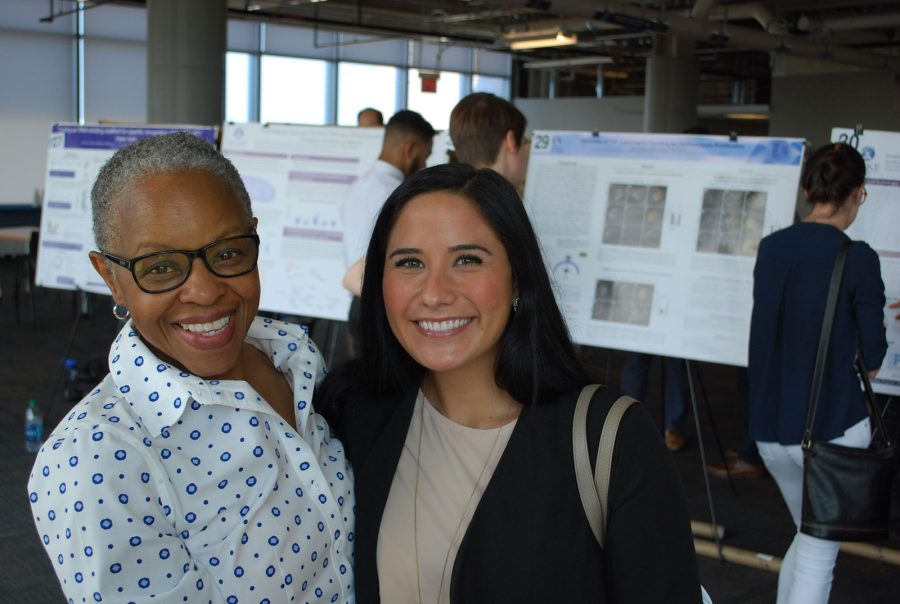
Duke UCEM Director Jacqueline Looney retired at the end of June after 30 exemplary years of service at the Duke Graduate School in support of graduate students. See the story on her career.
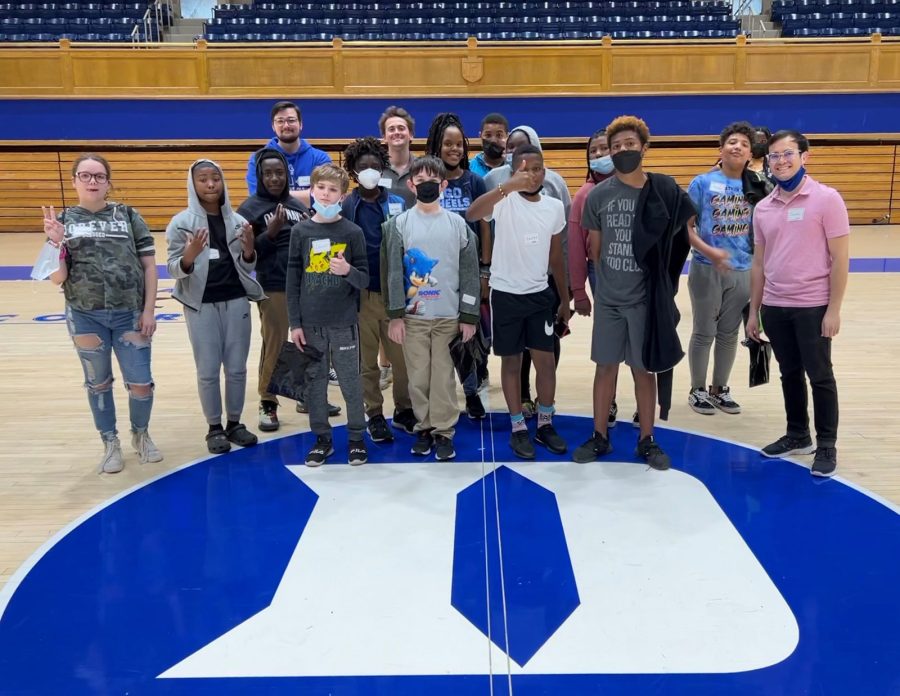
By John Zhu
When he was an undergraduate at Vanderbilt, Eric Yeats volunteered with an initiative to teach programming to K-12 students. In those sessions, students learned to write code that moved cartoon characters around a computer screen. While some of them had fun, Yeats felt something was missing from the experience—he wanted something more tangible than pixels on a screen.
Now entering his fourth year as a Ph.D. candidate at Duke, Yeats has spent the past few months creating the experience he envisioned by partnering with Durham Public Schools to offer a free robotics club for local middle schools that need more STEM-based afterschool opportunities.
“What really inspired me to do this project is I just really enjoy the process of engineering and problem-solving, and especially programming, and I just wanted to share how much I enjoy it with the kids at school,” said Yeats, a Sloan Scholar who is pursuing a Ph.D. in electrical and computer engineering in Professor Hai “Helen” Li’s lab.
Yeats pitched the idea to Durham Public Schools officials and received an enthusiastic response. For three months this spring, he spent three afternoons a week going to Lucas, Githens, and Lowe’s Grove Middle Schools for one- to two-hour afterschool sessions, teaching anywhere from five to 15 students how to program robots to avoid obstacles, understand voice commands, interact with each other, and even play soccer.
He also organized a Duke visit in May for the students, who toured the Shared Materials Instrumentation Facility and the Co-Lab Studio before ending their day at Cameron Indoor Stadium.
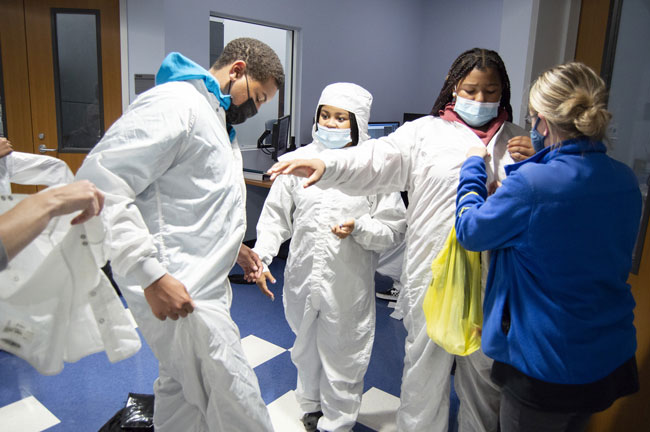
Middle school students from Eric Yeats’ robotics club try on clean-room suits during a tour of Duke research facilities.
“I wanted to start a program that was focused on programming and teaching engineering fundamentals, but was also fun,” Yeats said. “The goal wasn’t necessarily to have the students learn as much as possible about engineering, but to just see how fun it can really be.”
Funding for the robots came from a GradEngage Fellowship, which is part of the Purpose Project at Duke. The fellowship helps graduate students partner with local community organizations to develop solutions for pressing social issues. Yeats also got help from a couple of his labmates, as fellow Ph.D. students Brady Taylor and Edward Hanson helped facilitate some of the afterschool sessions and the students’ Duke tour.
While the GradEngage project period has ended, Yeats said Durham Public School officials are now talking to him about expanding the afterschool club into a yearlong program, securing other sources of funding, and getting more Duke students involved.
“The feedback has been good,” he said. “The students wrote me a card and they are going to mail it to me, so I’m really excited about that. And the site leaders apparently liked it a lot. The people from the administration at Durham Public Schools said, in their words, that the program got ‘rave reviews.’ ”
Video: Robots programmed by students in Yeats’ robotics club

This story is republished from the May 27, 2022, issue of the SloanConnect newsletter.
Sloan Leader Spotlight: Jackie Looney
After 30 years at Duke University, Senior Associate Dean Jackie Looney will retire next month. Dr. Looney was not only a critical part of the Sloan Scholar program at Duke, but she also led the creation of other programs that enhanced graduate student life on campus.
When she first arrived at Duke, she was a recent PhD graduate from Vanderbilt University. Initially an assistant dean for graduate recruitment, she took up the charge of creating services and finding resources to support graduate students. At first, she admits she didn’t entirely know the way, but she trusted her intuition (having just finished graduate school herself), and she knew how to do her research! She investigated other programs, looked at graduate schools across the country, and talked with students and faculty members about what they needed. With this approach, she used multiple voices and her own instincts to forge a path ahead.
Incorporating multiple voices was equally as important when launching the University Center of Exemplary Mentoring and Sloan Scholars program. At her suggestion, every academic department that signed on to the program had to commit two faculty champions. Additionally, she built in administrative support: every unit in the graduate school had to contribute, including academic affairs, finance, and admissions. This approach not only gave the Sloan Scholar program buy-in from the start, it also made it sustainable—multiple people in the graduate school contributed the program’s success.
To further its sustainability, Dr. Looney also aligned Sloan Scholars with the graduate school’s strategic plan, including recruitment, professional development, student well-being, and mentoring. She explains how this was a win-win: “While we wanted to have a program that was giving opportunity to underrepresented students, we also wanted to create a program that was going to benefit the larger graduate population at Duke.”
And Dr. Looney didn’t stop at Sloan Scholars. She also introduced a mentoring award, parental leave policy, and numerous other programs that benefit Duke students in real and meaningful ways.
“I am so proud to know that Duke is one of the graduate schools in the country that sets a standard—the standard of care for your students,” Dr. Looney says.
Those who work with her agree. “Having worked in higher education for over twenty years, there are people who stand out in my mind as true servants to the field. Jackie is one such person,” says Lorelle Espinosa, program director for higher education at the Alfred P. Sloan Foundation. “Jackie is on my short list of individuals to reach out to when in need of guidance. She is deeply passionate and skilled at advancing our mutual goals advancing diversity, equity, and inclusion in STEM higher education—I am indeed lucky to have her in my corner, and so is Sloan!”
Dr. Looney encourages students to approach their graduate work with similar tenets to her own career:
- Collaborate. Create a board of directors for your graduate career: a faculty advisor for academic requirements, a staff person for the ins and outs of the department, a senior grad student for a tutor and friend. “You can’t get everything that you need as a graduate student from one individual. Number one, you’re going to wear that person down. Number two, someone who’s comfortable helping you navigate the academic requirements may not be comfortable helping you navigate the personal matters,” she says.
- Reach out. Become engaged with the university, with the graduate school, with student groups, and with the community. Dr. Looney encourages student groups to reach across disciplines, across schools, and to bring other students in the mix. Broadening your view to include other people, other interests, and other members of your community will energize your work in the lab.
- Most importantly, have mentors. “The one thing that I know to be true about good mentoring is that when students have it, they are more productive, they become more involved in their departments, and they become more involved in the life of the university,” she observed. “They are more satisfied with their programs, where they are, what they’re doing.”
The Sloan Scholars program at Duke and other University Centers of Exemplary Mentoring have benefited from Dr. Looney’s vision, persistence, and wisdom. Thanks to her, graduate students—Sloan Scholars and otherwise—have greater opportunities and more fulsome support systems.
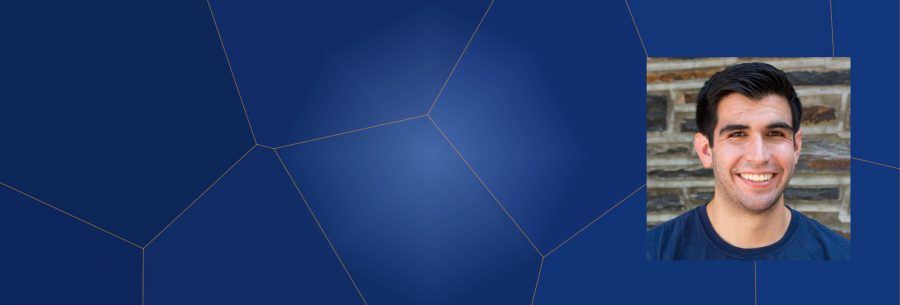
Sloan Scholar Gavin Gonzales was featured in the May 2021 issue of the SloanConnect newsletter. The profile is reprinted below with permission from the Sloan Foundation.
Sloan Scholar Spotlight: Gavin Gonzales
Gavin Gonzales is a rising third-year doctoral student in biomedical engineering at Duke University, where his academic career has evolved from theoretical ideas to applied research—a journey that reflects his passion for both learning and doing.
Gavin studied physics at the University of New Mexico, researching quantum dots and how they absorb and emit light. His work as an undergrad taught him that “research is about finding what makes something work, and then studying how that implication goes further.” He enjoyed physics and was interested in his research, but he couldn’t apply it to anything outside the lab.
His first opportunity to see how research can be taken further was at Duke during a summer research program through Maximizing Access to Research Careers (funded by the National Institutes of Health). There, he worked with bioengineering and biomaterials for the first time, and he realized the appeal of applied research. Then, the summer before he started his PhD, he worked at Draper Laboratory on prosthetic heart valves for children.
Both research experiences exposed him to the power of applied research and collaboration. The experience at Draper, in particular, made him realize his passion for bioengineering and the problems it solves, specifically at the intersection of academia, industry, and research. At Draper, he participated in collaborations between Draper researchers and professors at other universities, giving him insight into how industry collaborates with academia.
Now at Duke, Gavin is researching the design of knee-joint lubricants, investigating how they bind to cartilage and can reduce the amount of wear on the joint from daily activities. He is also designing a joint-model system to mimic the body’s repeated motion on cartilage.
For Gavin, this research is more than broadly practical: he worked at a physical therapy clinic throughout high school, and he was impressed by the therapies that improved people’s quality of life. Now as an adult, Gavin is passionate about spending time outdoors, hiking, running, and his own health in general. In bioengineering, his passion for knowledge can combine with real-world applications.
While Gavin was inspired by his time in private industry, he is just as passionate about staying in academia, wanting to become a professor after he graduates. He’s seen applied research from both sides, and he’s looking forward to collaborating with other researchers and other industries. But, importantly, he also wants to mentor students.
His own experiences with mentors have motivated him to expose as many people to good mentors as he can. Not only has Gavin been a one-on-one mentor, he also works on programs that bring mentoring to communities. Most recently, he volunteered in a mentoring program with the Society for Hispanic Professional Engineers. He’s also spoken to middle and high school classrooms, highlighting why he got into research and what he finds fun about it.
“Being a mentor has made me realize that in order to help someone, you need to understand what they are looking for. Now I know I need to communicate my expectations to my mentors so they can help me. Two-way communication is very important.” When he has struggled with coursework in the past, he had a similar approach: reach out to peers with your challenges. Usually, each person is struggling in a specific way, and your classmate may have an understanding you don’t, and visa versa.
Just as Gavin seeks to apply what he learns and share that knowledge with others, he recommends other Sloan Scholars do the same. “Be ambitious, figure out your goals, and share them with as many people as you can. Make connections, advocate for yourself, and know that you can help yourself develop the most.” For him, being a Sloan Scholar (and now a member of the SloanConnect Student Advisory Committee) means having access to professional development, mentors, and friends—”a community away from home.”
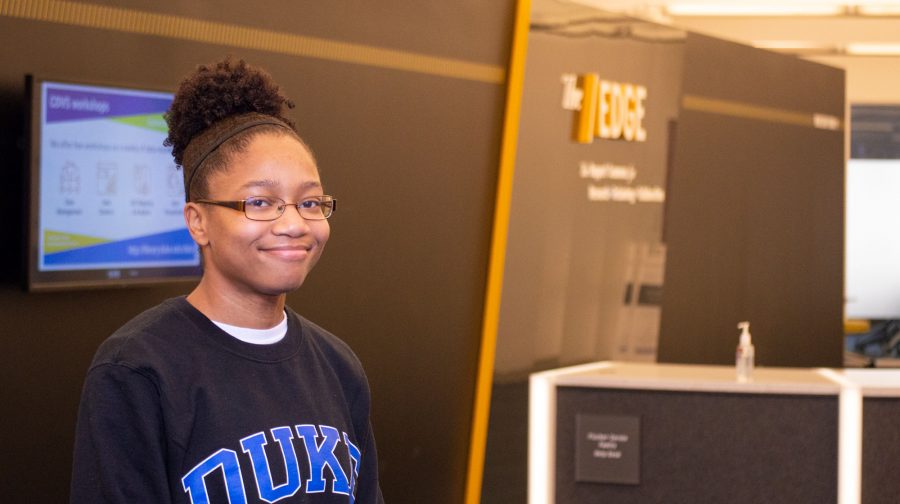
By Hanna Grimm
Duke Graduate School Communications Intern
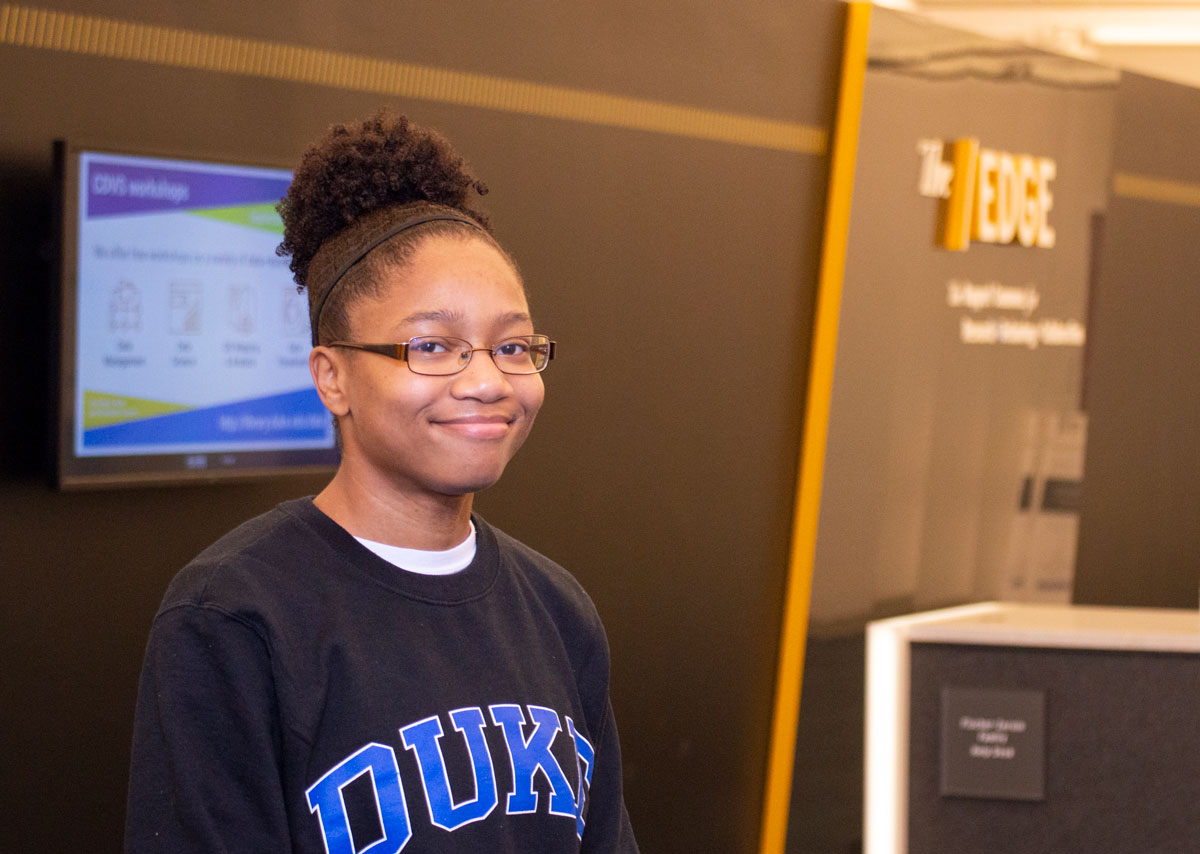 Hadiya Harrigan
Hadiya Harrigan
Ph.D. Student in Mechanical Engineering
Fall 2018 Cohort
Tell me a little about what brought you to Duke.
One of my personal goals was to pursue a Ph.D., but I wasn’t sure exactly what within mechanical engineering I wanted to study or what school I wanted to attend. Therefore, I researched various schools and mechanical engineering programs; Duke was one of the schools that I decided to apply to. I was interested in what the professors were doing, specifically my adviser, Dr. Aquino. I was excited to learn more about computational mechanics, data-driven modeling, and inverse problems.
How has the Sloan Scholarship helped you?
One of the main reasons I liked the Sloan Scholarship—although I didn’t get to take full advantage of this resource—was the Early Start program. When I was transitioning from high school to undergrad, I was a part of an undergraduate early-start program at Tuskegee University. This program was beneficial because I got to know a few people before school started, take some classes, and get acclimated to Tuskegee. I liked that the Sloan Scholarship has a somewhat similar program. I wasn’t able to go because I had an internship already lined up, but I did get to participate in some events virtually. It was nice to get some tips and tricks on how to do well in graduate school. There were a lot of awesome opportunities from attending those seminars online.
Tell me about your research.
My research is related to physics-based modeling and machine learning. Over the summer, I completed a small project as an introduction to using machine learning for sound identification. When I formally start my research, I’ll use machine learning with ultrasound scans to diagnose patients’ vascular health as healthy or unhealthy. Physics-based modeling will provide more in-depth understanding of the machine learning model parameters.
What are some significant experiences you had as a result of the program?
Every semester we meet with the Graduate Sloan Intern in small groups to support and uplift one another. Additionally, The Graduate School hosts plenty of events for us. We have various lunches where different speakers talk to us about their graduate experience and give us advice. Those events have made my experience as a graduate student better.
What do you like about Duke so far?
On campus, my favorite thing is all the study areas. For example, The Edge is awesome; there are white boards and study rooms everywhere. The whole campus is very conducive to studying.
What are some challenges you’ve encountered and how have you overcome them?
My biggest challenge right now is classes. I found it hard to transition from undergrad to graduate classes. For example, I didn’t take linear algebra in undergrad and now that I’m in a computational mechanics lab, linear algebra is very important. It was difficult to come in without that background. To overcome this challenge, I went to Math Help Room regularly, formed study groups, and talked to students with more Linear Algebra experience.
Additionally, Sloan has been a great resource, and I’m a part of a newer group called Sisters in STEM. Dean [Jacqueline] Looney in The Graduate School is one of the program leaders, and we get together once a month for conversation. We talk about struggles we are having in graduate school and outside of graduate school, including finding work-life balance.

By Jillian Daly
Duke Graduate School Communications Intern
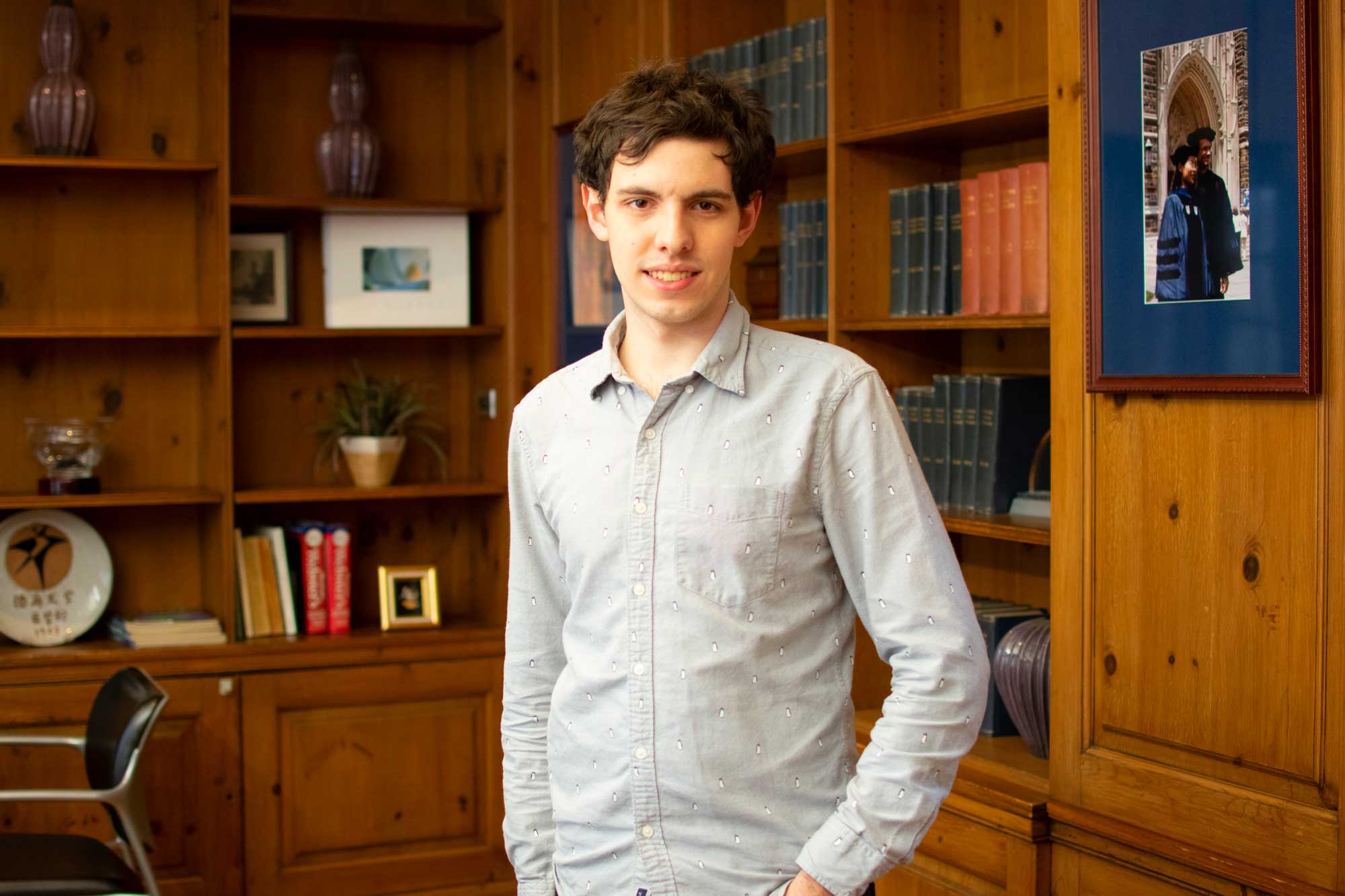 David Pujol
David Pujol
Ph.D. Student in Computer Science
Fall 2018 Cohort of Sloan Scholars
Tell me a little about what brought you to Duke.
A lot of the things that make Duke unique to me is what brought me here. For example, I have a family. I have a wife and a small kid, so when I came in for interviews one of the things that made Duke unique was that they offered to accommodate for my family and have them come over and see the campus themselves. All of that extra effort that went in to accommodate for my family is what made me feel welcome, and what made Duke different from other schools.
How has the Sloan Scholarship helped you?
In addition to the financial resources, which are great, Sloan has given me opportunities to not only work with people in different disciplines, but it also gave me the opportunity to acclimate and get used to the Ph.D. experience ahead of time. I came in over the summer and we had our Early Start program, which really helped me find who I wanted to work with in my own department, as well as other things. Sloan also got us used to all of the resources offered by not only The Graduate School, but also Duke in general. Having that time to come in early gave me time to learn all of those things so I wouldn’t have to learn about them while I’m trying to work on my academia at the same time.
Tell me about your research.
I work in the Department of Computer Science, where I specialize in the intersection between data privacy and algorithmic fairness. With the general idea being that we have methods to protect data privacy when doing statistics methods, and we have some algorithms that are considered “fair.” I study what happens when you use privacy–protected data in a fair setting. Does the algorithm remain fair? Do the fairness conditions break down? My job is to make sure that this composes well.
What are some significant experiences that you have had as a result of the Sloan Scholars program?
I’ve really enjoyed some of the experiences we’ve had as Sloan Scholars to interact with incoming students. The hardest part about graduate school so far has been applying, because you go through the application process and you have no idea how you’re supposed to present yourself, what you’re getting into, or what they want to see. Especially when you write the personal statement, it can be very difficult. So having a chance to look at all these students who are now trying to apply to graduate school, give them advice, help them and tell them what graduate school is all about is great.
What do you enjoy most about Duke so far?
I really enjoy the community and how well it receives divergent ideas. At least in my department, I’ll go into a room and talk with a bunch of other graduate students and we’ll have different ideas on how to approach the same topics. While we all might have some disagreements on whether some things are reasonable, we are all willing to listen to each other and have those kinds of conversations.
When I applied, I feared that the research environment would be so competitive that I wouldn’t be able to talk to other students about my work without them stealing my work. The fact that I can turn around and talk to other students in my office and say, “Hey do you guys think this is a good idea or am I just going nuts?” without any fear of repercussions or them thinking badly of me shows that the environment is in such an accepting, healthy state.
What are some of the challenges you have encountered and how have you overcome them?
Having a family, especially as a graduate student, makes you significantly different from most people. It makes it hard to break into friend groups and have a social experience, but Duke has a couple of programs for that. The GradParents support groups have been very helpful with finding other graduate students who are parents, and find those people that you can more directly relate to. If I were to talk to my officemates about children, their eyes would glaze over because they would have no idea what I’m talking about. Finding other students through the parent support groups has allowed me to have those conversations, and that’s something that I never really expected to find.

